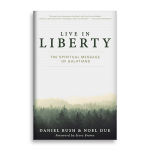
This is a guest post by Dr. Daniel Bush. Daniel is pastor of NorthPointe Church in Union, KY, and the author of Live in Liberty: The Spiritual Message of Galatians and Embracing God as Father: Christian Identity in the Family of God. His newest book is Undefended: Discovering God when Your Guard Is Down.
Attending a women?s seminary in South Hadley, Massachusetts, for a year, she was pulled from the school by her father in 1848 due to her fragile emotional state that chafed beneath the school?s institutional tone, strict rules, and invasive religious practices. Finding herself averse to many of the religious norms of her day, and living a reclusive life from her twenties till her death at fifty-five, Emily Dickinson was yet in touch with deep feelings and the universal quest for the absolute. One of her poems speaks of hope as a bird, which, although vulnerable to the storms of hardship, nevertheless sings to the soul.
?Hope? is the thing with feathers?
That perches in the soul?
And sings the tune without the words?
And never stops?at all?
And sweetest?in the Gale?is heard?
And sore must be the storm?
That could abash the little Bird
That kept so many warm?
I?ve heard it in the chillest land?
And on the strangest Sea?
Yet, never, in Extremity,
It asked a crumb?of me.
Hope forgotten is life-defeating and hope found is life-giving, but true hope is never of our own fashioning. It?s of a wholly different order, arising from a wholly foreign quarter.
Too often, I?ve received word of a Christian pastor who, colliding with difficulty or shame, has lost hope and taken his life. It?s sad that so many walk alone, cloaked and hidden, fearful of being seen, even by a few who hear ?the tune without the words.? Author Mandy Smith notes that God ?seems to see some kind of renewable resource in human emptiness, a power source in human weakness, which leads him to make the very odd choice to call us to ministry.? Why? Perhaps it?s because he?s not interested in merely communicating ideas or rules, but in expressing his heart. ?To tell his story, God often begins with human limitation?a blank canvas where he can begin creating? (The Vulnerable Pastor).
In 2007, pastor and author John Piper spoke about the resurrection at Texas A&M University to an assembly of 5,000 students. He prefaced his message with these words:
My wife and I met for lunch yesterday. ? I had been praying for some time about a very important subject that I wanted to talk with my wife about, a weighty subject. We had that conversation, and it went very badly. My wife and I have hardly spoken a word since yesterday at lunch. We tried to speak yesterday afternoon but all I wanted to do was cry. ? When I left this morning we didn?t have the opportunity to speak. I had to get to the airport and get to the plane and fly here. I kissed her on the cheek and said, ?This is not your problem, it is my problem, and I will talk about it when I get back.? And I got on the plane and I haven?t spoken to her since. That?s how it is in the Piper household right now.
Here are three reasons why I?m telling you this. Number one, you need to know that when hotshot preachers come to campus they are imperfect, fallible, emotionally embattled sinners who need a savior every day of their lives. So beware?young people?of thinking too highly of any man.
Number two, the death and resurrection of Jesus Christ are precious to me, not because they turn my life into a string of successes, but because they keep me from collapsing under my string of failures.
And the third and last reason?is that hundreds of you in this room came to this room frustrated and discouraged, and disappointed in something that hasn?t gone at all the way you hoped; fearful about something in the future, tonight or five years from now; confused about theological things?maybe things you?re hearing in classes; angry at somebody; full of lust, perhaps.?
You need to know that I have good news for you?but it?s perhaps not the good news that you thought it would be: your final healing is as far away as your resurrection from the dead; however, your invincible joy of hope is as close as the risen Christ (?Radical Effects of the Resurrection?).
Hope isn?t engineered out of interlacing wealth, scholarship, a stroke of luck, and fine health into a string of successes. Nor is it erected out of good acts, and far less out of moral attainment. Hope, the stalwart stuff that sustains when all other lights go out, arises singularly in the resurrection of the Lord Jesus, which, as Dickinson put it, ?never, in Extremity, / It asked a crumb?of me.? It lives quite apart from my sustaining it, even apart from my believing it. It therefore imparts an innervating light, one which Peter captures in a promise: Our merciful God has given us ?a living hope through the resurrection of Jesus,? including us in an inheritance that is ?imperishable and undefiled and unfading? and which he holds for us, whom he himself is preserving (1 Pet 1:3?5).
What do these words offer in your journey this day?
They were addressed first to Christians in the Roman Empire (likely in Rome itself; see 1 Pet 5:13) who stood out as aliens against the surrounding culture and knew the pain of persecution on account of their newfound allegiance. Relief was little more than a dream. Without a doubt they were befuddled, fearful, forlorn, and likely felt forsaken. They needed to hear the song of the little Bird, as perhaps do you.
The passage is doxological, yet Peter doesn?t offer over-the-top platitudes, singing of daisies and daffodils. When one is slogging one?s way through a sea of troubles, coming across the musings of an insouciant minstrel is just plain irritating. Peter?s aim, however, is to make one thing clear: The Father is for you; he?s pro-you.
This isn?t a mercenary thought, but a magnanimous one. Theologians have jawed about it for centuries and labeled it as God?s promeity, a word that comes from the Latin pro me, meaning ?for me.? ?Christ is Christ, not just for himself, but in relation to me,? wrote Dietrich Bonhoeffer. ?His being in Christ is for me, pro me. This being pro me is not to be understood as an effect emanating from him, nor as an accident, but it is to be understood as the essence, the being of the person himself. The core of the person himself is pro me? Christ can never be thought of as being for himself, but only in relation to me? (Christ the Center). Jesus is for you, not as a temporary annuity, but eternally, for ?even while we were enemies we were reconciled to God through the death of his son? (Rom 5:10). And since it?s in Christ where we encounter the Father (John 14:9; Isa 7:14), Christ?s promeity is also the Father?s promeity.
For the one who has an ear, this promise lifts from listlessness and impels beyond the doldrums into the sturdy trade winds of the Spirit?into relentless reliance. It?s why Peter is drawing our attention to Jesus? resurrection, doing far more than simply acknowledging that one who was dead, decaying, and detestably odorous got up and danced.
A decade ago I met with my pastor for coffee. My wife had left me and I was feeling low, abandoned, and doubtful. If God were truly good, I thought, surely he would show up and get me out of the mess. My pastor?s words, ?Remember the resurrection,? left me impassive. Thankful for the company, I left the shop thinking, ?What a fruitless conversation.?
A few days later his words refused to take a vacation, so I thought I?d wish them bon voyage, and wrote to him, explaining with care that they?d neither dented my despondency nor touched my soul. I wasn?t interested in what I?d taken to be a ?pie in the sky when you die? platitude. I was after instant relief, ?cash in the stash.? Yet I?d utterly missed the point: God?s promeity is the very thing communicated through the resurrection?nothing could be less intangible!
We all desire relief in our time. There?s no shame in that: a change in our condition or circumstances, something to get us to the end of the day with the hope that it will all look better in the morning. We desire something that will not fail or fade. This is why Peter offers us a glimpse of what the Father has done in time and space: he has caused us ?to be born again to a living hope through the resurrection of Jesus Christ from the dead into an inheritance imperishable and undefiled and unfading? (1 Pet 1:3-4). That?s the type of heavenly Father we have. We can?t afford to lose sight of this eternal Father as our situations come and go, stuff rots, and people fail us. At the base of lost hope is the loss of relational connection, and the Father?s love is the only thing in this world which is stable and sure.






